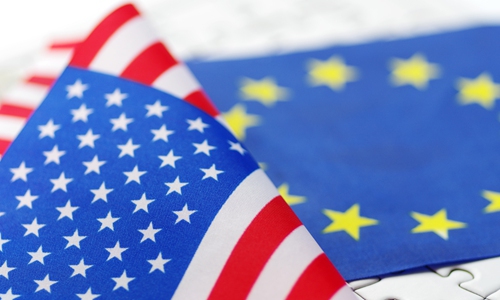HOME >> OPINION
US ‘long-arm jurisdiction’ on gas project driven by insecurity
By Dong Yifan Source:Global Times Published: 2020/1/1 18:38:09

File Photo: IC
The National Defense Authorization Act for Fiscal Year 2020, signed by US President Donald Trump on December 20, includes sanctions targeting entities and individuals that participated in Nord Stream 2 pipeline linking Russia and Germany. In keeping with sanctions, assets may be blocked or frozen, and entry into US may be denied.
Aggressive US interference in EU-Russia energy cooperation has triggered strong resentment in Europe and Russia. Washington's response shows that US "long-arm jurisdiction" is the new normal. The US has demonstrated that it is a bully by placing its own interests above other countries' political, economic and diplomatic interests.
The Nord Stream 2 gas pipeline is an energy project started by Russia and the EU in 2017. It plans to build a natural gas pipeline directly between Russia and Germany, with the total capacity of the two strings of Nord Stream 2 at 55 billion cubic meters of gas every year. This is expected to improve convenience and reduce the cost of nature gas transportation between Russia and Europe. At the same time, it can better protect the EU's natural gas supply and consolidate Russia's market in Europe.
However, the Trump administration regards Nord Stream 2 as a thorn in its side. Trump has linked Nord Stream 2 with NATO defense spending bill. Many US officials, including US Ambassador to Germany Richard Grenell and US Secretary of Energy Dan Brouillette, have been recently active in Europe, trying to use energy security concerns to warn European countries of Nord Stream 2. The US is normalizing and expanding its "long-arm jurisdiction" - using domestic legislation to punish foreign companies and individuals.
First, the US undermines other countries' cooperation for its own economic interests. As US oil and gas production has increased in recent years, Europe has become an important targeted market for the US liquefied natural gas (LNG). The US regards Russia, the EU's largest natural gas supplier, as its biggest competitor. As the US interferes in Nord Stream 2, it also sells its own LNG and even labels it as the so-called freedom gas, forcing Europe to give up legal and reasonable commercial contracts. The US fabricates security issues related to normal economic cooperation, and uses its security cooperation with allies to force other countries to give up their own interests and yield to Washington.
Second, to achieve its goals, the US does not hesitate to drive a wedge among EU members. Bloc countries have different positions on EU-Russia energy cooperation. Poland and the Baltic countries are guarded against Russia, and thus oppose projects such as Nord Stream 2 that help Russia increase participation in the EU's energy supply and gain economic benefits. The US regards Poland as a natural ally and takes the opportunity to sell its LNG to the country. In June, Poland agreed to buy an additional 2 billion cubic meters of LNG from the US for almost $8 billion. Poland will also terminate its gas supply deal with Russia by the end of 2022. Grenell even defended Nord Stream 2 sanctions this time as "pro-European." However, the act triggered fierce rejections from Europe. German Foreign Minister Heiko Maas has said the sanctions are "interference in autonomous decisions taken in Europe."
Third, the US is trying to force Europe to choose sides and give up diplomatic autonomy. The US uses great power competition and the logic of zero-sum game to deal with diplomatic affairs. The US considers Russia as its target of containment and regards Europe as a pawn in Washington's alliance system. Europe, however, is facing challenges internally and externally. Europe wants to seek a plan to ease confrontation with Russia and to respect each other's core interests. Energy cooperation is the cornerstone of Europe-Russia relations.
However, the US move will make the EU's diplomatic and energy policies hostage to the US alliance system and containment strategy. Currently, the EU regards independence and solidarity as development goals and a path to safeguard its own interests. It wants to implement strategic autonomy and European sovereignty. The Nord Stream 2 sanctions directly challenge EU efforts.
It is foreseeable that Europe and the US will face more differences as the dispute over the Nord Stream 2 pipeline intensifies. Brussels and Washington are deeply divided over practical interests in various aspects, basic concepts of international relations, and even notions of responsibility and morality. The Nord Stream 2 pipeline project has further intensified Europe's unease with US interventionism and egoism.
Obviously, the US move reflects its bid to adopt an all-round "long-arm jurisdiction" on all countries across the world, including its allies, over politics, economy, diplomacy and security, neglecting the basic norms of international relations such as respect for sovereignty and regard for each other's choices. In this context, Europe will pursue its sovereignty more firmly.
The author is a research fellow with the Institute of European Studies, China Institutes of Contemporary International Relations. opinion@globaltimes.com.cn
Posted in: VIEWPOINT